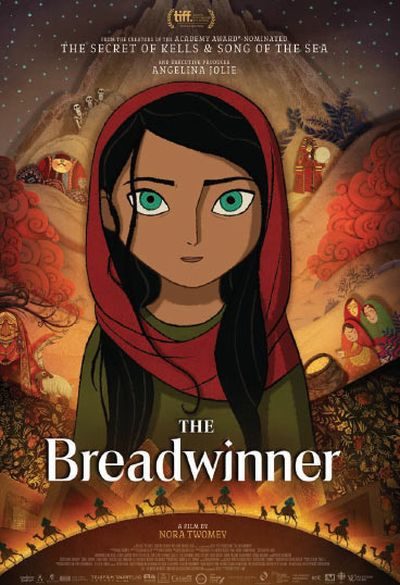★★★
“Burka-to-back.”
 Around the turn of the millennium, Parvana (Chaudry) is an 11-year-old girl living in Kabul, Afghanistan – then under the strict religious rule of the Taliban, in the aftermath of the Russian retreat. Her father is arrested and taken off to prison, leaving his wife and children without a male guardian. Which is kinda important, because under Taliban law, women are not allowed out in public unaccompanied. With no other option, Parvana cuts her hair and dresses as a boy in order to be able to get supplies for her family. Teaming up with another boy-who-isn’t, Shauzia (Bhatia), they find work. Parvana starts saving for the bribes necessary to see, and hopefully win the release of, her father; Shauzia is saving up for her long-held dream of seeing the ocean. Of course, it’s never that easy, especially post-9/11, when the country is invaded by America and its allies.
Around the turn of the millennium, Parvana (Chaudry) is an 11-year-old girl living in Kabul, Afghanistan – then under the strict religious rule of the Taliban, in the aftermath of the Russian retreat. Her father is arrested and taken off to prison, leaving his wife and children without a male guardian. Which is kinda important, because under Taliban law, women are not allowed out in public unaccompanied. With no other option, Parvana cuts her hair and dresses as a boy in order to be able to get supplies for her family. Teaming up with another boy-who-isn’t, Shauzia (Bhatia), they find work. Parvana starts saving for the bribes necessary to see, and hopefully win the release of, her father; Shauzia is saving up for her long-held dream of seeing the ocean. Of course, it’s never that easy, especially post-9/11, when the country is invaded by America and its allies.
A well-drawn exercise in paradox, it’s interesting to see liberal Hollywood attempt to juggle two of its favoured topics: feminism and Islam. Though in the end, this more or less says “Screw it,” and comes down firmly on the side of the former. For if you didn’t hate Islam before this film… you probably will by the time it’s over. Technically of course, the villain here is fundamentalism, in the malevolent shape of the Taliban; yet, this is the only kind of religion depicted in the movie. It’s not even clear if Parvana and her family are Muslim; they certainly don’t go to a mosque, and their existence seems entirely secular. On that basis, I’m quite surprised the film hasn’t been called out for Islamophobia, but I guess those gatekeepers were probably too busy nodding approvingly at the message of feminist liberation.
Moving on from tdubious socio-political messages which I can take or leave, as an animated feature, I liked this rather better. It intertwines Parvana’s efforts, both to contact her father and simply survive, with her telling the folk-tale of The Elephant King – making its hero her brother, who was previously killed by a land-mine left over from the Soviet occupation. The two threads use different yet complementary styles of animation to separate the “real” world from Parvana’s story, and it’s an effective way of depicting them. Parvana, too, makes for a solid heroine: brave and loyal to her family, while being too innocent and young to know the awkward questions she isn’t supposed to ask e.g WHY women aren’t allowed to go out unaccompanied.
Twomey was co-director of Oscar winner The Book of Kells, and it’s nice to see some animation that isn’t intent on being 3D and photo-realistic, so much as serving the story and the characters. It is sometimes a little hard to put aside the obvious intent as social propaganda, but I’ve never been one who felt you had to agree entirely with a film’s politics, in order to admire its artistic qualities. The latter are decent enough here to make for a worthwhile, if slightly too earnest, viewing experience.
Dir: Nora Twomey
Star (voice): Saara Chaudry, Soma Bhatia, Noorin Gulamgau, Kawa Ada




